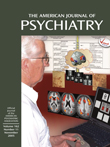Deep Brain Stimulation for OCD and Major Depression
We previously reported the case of Mr. A, a 56-year-old man suffering from a severely disabling and refractory form of OCD that began over 4 decades before (2). He mainly experienced somatic obsessions concerning potential disturbances in bodily functioning, especially regarding his arms, fingers, legs, and gastrointestinal tract, and his mental capacities, with compulsive verification of functioning, comprising repetitive voluntary movements, controlled intake of foods according to their purgative properties, and repeated mental acts of questioning. Aggressive obsessions with fear of embarrassing thoughts about his children occurred, although considerably less frequently. OCD coexisted only with a lifetime history of recurrent major depression. Mr. A’s written informed consent had been obtained before his participation in the study. Psychiatric assessments included the Yale-Brown Obsessive Compulsive Scale, the Hamilton Depression Rating Scale, the Hamilton Anxiety Rating Scale, and the Global Assessment of Functioning (GAF) scale. Neuropsychological assessments consisted of a wide range of tests primarily exploring memory and executive functions (2). These evaluations were performed independently and blindly, regarding stimulation settings. No pharmacological and/or psychological treatment was administered postoperatively.We previously reported that deep brain stimulation of the ventral caudate nucleus progressively improved Mr. A’s depressive and anxiety symptoms until remission was achieved at 6 months (Hamilton depression scale score ≤7 and Hamilton anxiety scale score ≤10) (2). There was also a marked but delayed reduction in OCD symptom severity on the Yale-Brown Obsessive Compulsive Scale from a baseline score of 25 to 10 and 14 at 12 and 15 months after deep brain stimulation, respectively. His level of functioning on the GAF scale gradually increased from 35 to 60 over the first 15 months of the postoperative period (2). Failure of the pulse generator battery, which was discovered after a clinical impairment, did not affect depressive and anxiety symptom intensity but worsened his obsessive-compulsive manifestations, especially his somatic preoccupations and the related checking compulsions (Yale-Brown Obsessive Compulsive Scale score=21), with a slight deterioration of global functioning (GAF scale score=55) at 18 months. A return to remission levels of OCD (Yale-Brown Obsessive Compulsive Scale score <16) was observed 3 months after replacement of the generator and remained stable until the end of the 27-month follow-up (final Yale-Brown Obsessive Compulsive Scale score=12). This was paralleled by an improvement in psychosocial functioning (final GAF scale score=65). Of interest, no neuropsychological alteration or any adverse clinical effect was reported.
References
Information & Authors
Information
Published In
History
Authors
Metrics & Citations
Metrics
Citations
Export Citations
If you have the appropriate software installed, you can download article citation data to the citation manager of your choice. Simply select your manager software from the list below and click Download.
For more information or tips please see 'Downloading to a citation manager' in the Help menu.
View Options
View options
PDF/EPUB
View PDF/EPUBGet Access
Login options
Already a subscriber? Access your subscription through your login credentials or your institution for full access to this article.
Personal login Institutional Login Open Athens loginNot a subscriber?
PsychiatryOnline subscription options offer access to the DSM-5-TR® library, books, journals, CME, and patient resources. This all-in-one virtual library provides psychiatrists and mental health professionals with key resources for diagnosis, treatment, research, and professional development.
Need more help? PsychiatryOnline Customer Service may be reached by emailing [email protected] or by calling 800-368-5777 (in the U.S.) or 703-907-7322 (outside the U.S.).

